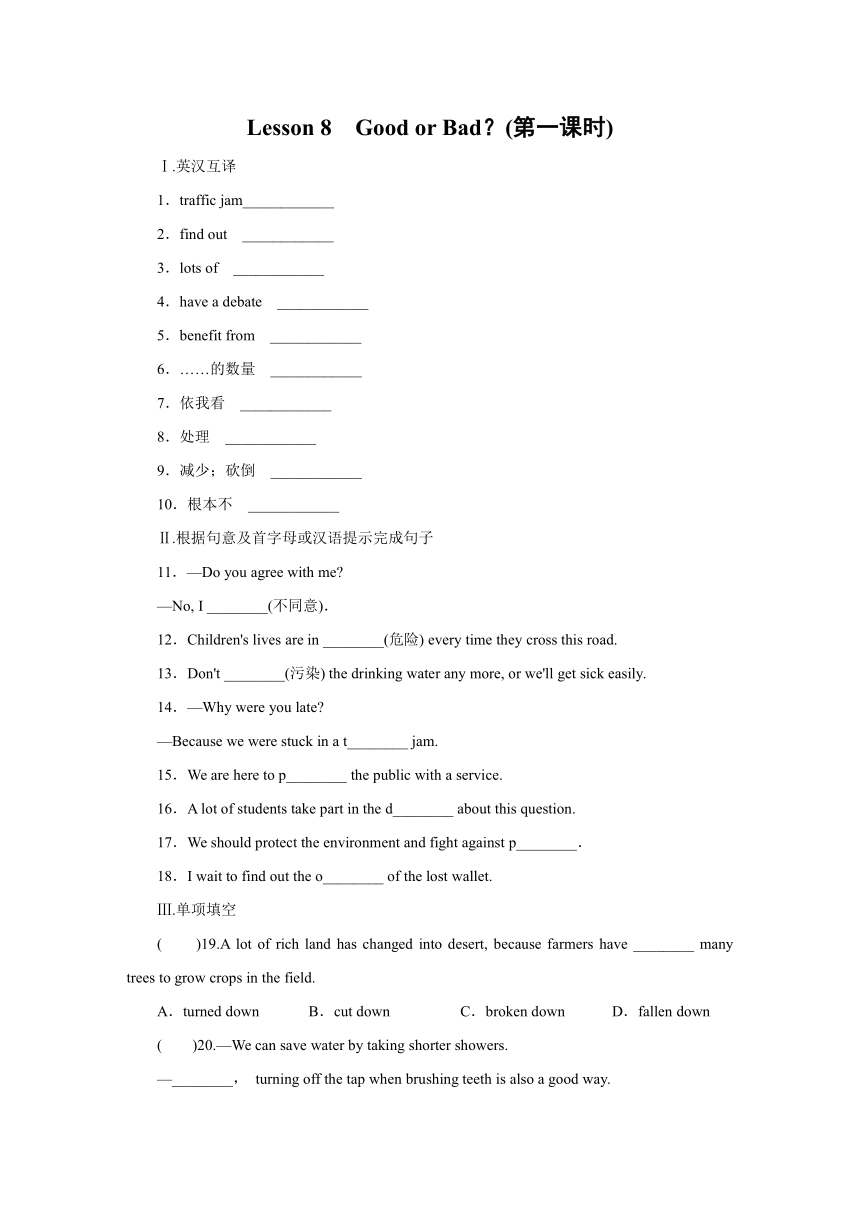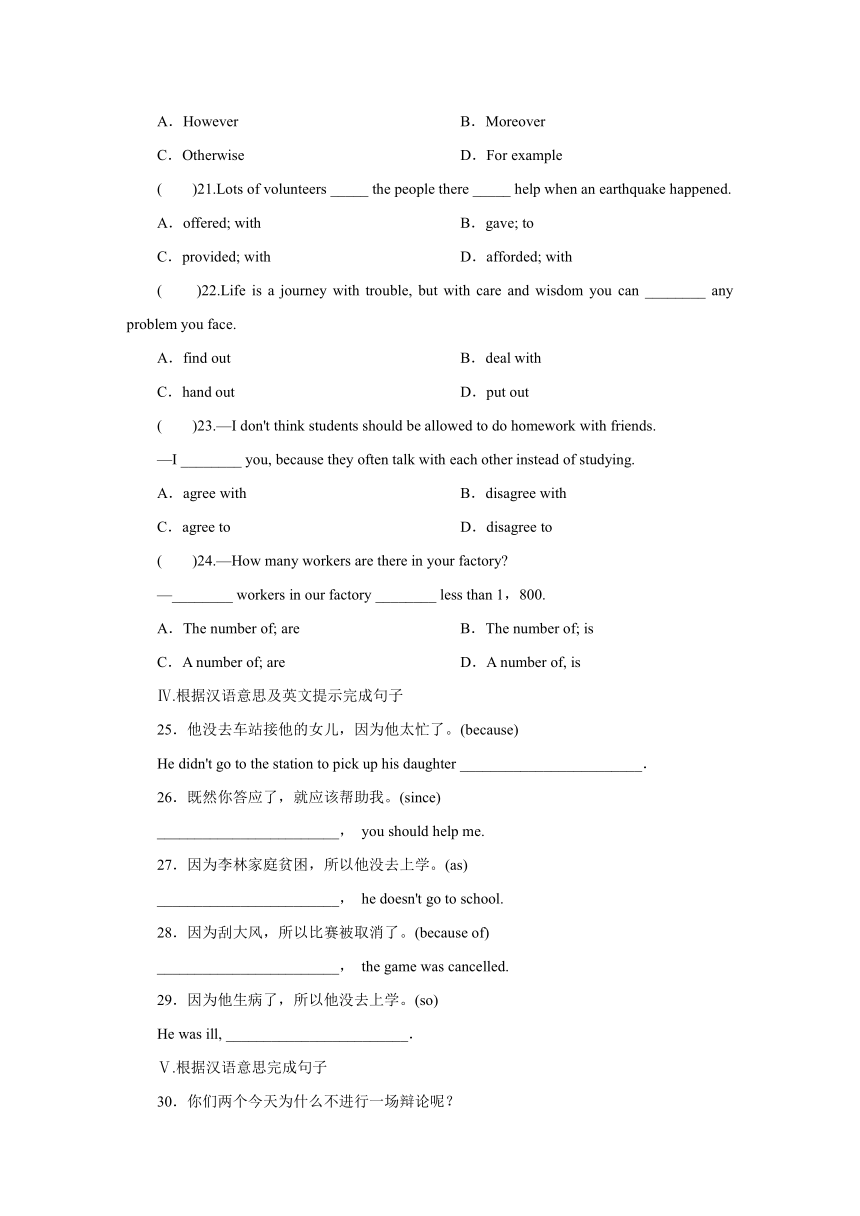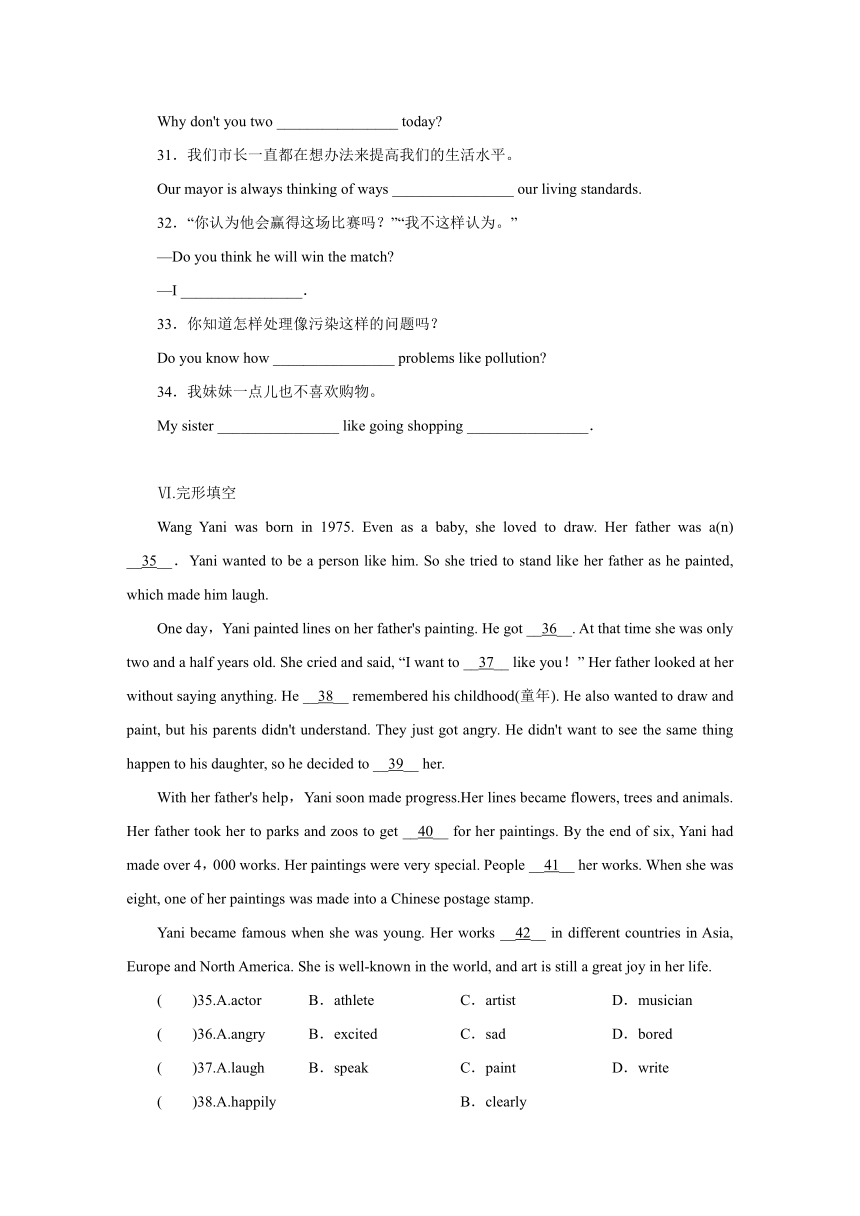北师大版英语九年级全一册Unit 3 Creativity Lesson 8 Good or Bad?(第一课时)同步课时练习(含答案解析)
文档属性
| 名称 | 北师大版英语九年级全一册Unit 3 Creativity Lesson 8 Good or Bad?(第一课时)同步课时练习(含答案解析) |

|
|
| 格式 | docx | ||
| 文件大小 | 28.4KB | ||
| 资源类型 | 教案 | ||
| 版本资源 | 北师大版 | ||
| 科目 | 英语 | ||
| 更新时间 | 2022-05-02 10:15:04 | ||
图片预览



文档简介
Lesson 8 Good or Bad?(第一课时)
Ⅰ.英汉互译
1.traffic jam____________
2.find out ____________
3.lots of ____________
4.have a debate ____________
5.benefit from ____________
6.……的数量 ____________
7.依我看 ____________
8.处理 ____________
9.减少;砍倒 ____________
10.根本不 ____________
Ⅱ.根据句意及首字母或汉语提示完成句子
11.—Do you agree with me
—No, I ________(不同意).
12.Children's lives are in ________(危险) every time they cross this road.
13.Don't ________(污染) the drinking water any more, or we'll get sick easily.
14.—Why were you late
—Because we were stuck in a t________ jam.
15.We are here to p________ the public with a service.
16.A lot of students take part in the d________ about this question.
17.We should protect the environment and fight against p________.
18.I wait to find out the o________ of the lost wallet.
Ⅲ.单项填空
( )19.A lot of rich land has changed into desert, because farmers have ________ many trees to grow crops in the field.
A.turned down B.cut down C.broken down D.fallen down
( )20.—We can save water by taking shorter showers.
—________, turning off the tap when brushing teeth is also a good way.
A.However B.Moreover
C.Otherwise D.For example
( )21.Lots of volunteers _____ the people there _____ help when an earthquake happened.
A.offered; with B.gave; to
C.provided; with D.afforded; with
( )22.Life is a journey with trouble, but with care and wisdom you can ________ any problem you face.
A.find out B.deal with
C.hand out D.put out
( )23.—I don't think students should be allowed to do homework with friends.
—I ________ you, because they often talk with each other instead of studying.
A.agree with B.disagree with
C.agree to D.disagree to
( )24.—How many workers are there in your factory
—________ workers in our factory ________ less than 1,800.
A.The number of; are B.The number of; is
C.A number of; are D.A number of, is
Ⅳ.根据汉语意思及英文提示完成句子
25.他没去车站接他的女儿,因为他太忙了。(because)
He didn't go to the station to pick up his daughter ________________________.
26.既然你答应了,就应该帮助我。(since)
________________________, you should help me.
27.因为李林家庭贫困,所以他没去上学。(as)
________________________, he doesn't go to school.
28.因为刮大风,所以比赛被取消了。(because of)
________________________, the game was cancelled.
29.因为他生病了,所以他没去上学。(so)
He was ill, ________________________.
Ⅴ.根据汉语意思完成句子
30.你们两个今天为什么不进行一场辩论呢?
Why don't you two ________________ today
31.我们市长一直都在想办法来提高我们的生活水平。
Our mayor is always thinking of ways ________________ our living standards.
32.“你认为他会赢得这场比赛吗?”“我不这样认为。”
—Do you think he will win the match
—I ________________.
33.你知道怎样处理像污染这样的问题吗?
Do you know how ________________ problems like pollution
34.我妹妹一点儿也不喜欢购物。
My sister ________________ like going shopping ________________.
Ⅵ.完形填空
Wang Yani was born in 1975. Even as a baby, she loved to draw. Her father was a(n) __35__.Yani wanted to be a person like him. So she tried to stand like her father as he painted, which made him laugh.
One day,Yani painted lines on her father's painting. He got __36__. At that time she was only two and a half years old. She cried and said, “I want to __37__ like you!” Her father looked at her without saying anything. He __38__ remembered his childhood(童年). He also wanted to draw and paint, but his parents didn't understand. They just got angry. He didn't want to see the same thing happen to his daughter, so he decided to __39__ her.
With her father's help,Yani soon made progress.Her lines became flowers, trees and animals. Her father took her to parks and zoos to get __40__ for her paintings. By the end of six, Yani had made over 4,000 works. Her paintings were very special. People __41__ her works. When she was eight, one of her paintings was made into a Chinese postage stamp.
Yani became famous when she was young. Her works __42__ in different countries in Asia, Europe and North America. She is well known in the world, and art is still a great joy in her life.
( )35.A.actor B.athlete C.artist D.musician
( )36.A.angry B.excited C.sad D.bored
( )37.A.laugh B.speak C.paint D.write
( )38.A.happily B.clearly
C.hardly D.usually
( )39.A.help B.stop C.refuse D.ask
( )40.A.news B.time C.views D.ideas
( )41.A.hated B.loved C.found D.agreed
( )42.A.sold B.were sold C.sell D.selling
Ⅶ.阅读短文,根据短文内容回答问题
We see them everywhere—on boxes of food, on packages and on CDs.
They, of course, are bar codes. The invention of bar codes has changed the way we shop and how companies learn where their products are.
It was two university students from America, Bernard Silver and Norman Woodland, who first got the idea of bar codes. In 1948, they heard that the president of a food company was looking for a way to easily get information about what was being sold to customers. They tried to help by using a code system. They invented a large electronic reader to read the codes. However, computers couldn't easily record the data that was read.
Then, in the 1960s, David Collins made important developments in bar codes. He developed a system for recognising train carriages. In order to develop the recognition system for other kinds of businesses, Collins started his own company. In 1969, Collins's company put a bar code reading system in a car factory, showing that bar codes could be useful.
Shortly after Collins started his company,an American electronic company called RCA also saw the potential(潜力) of bar codes to help businesses. RCA's system, which recorded how much of a product was sold, was not perfect. Since bar codes were not common, not all products had them and different companies used different codes. Then, Woodland helped develop the Universal Product Code(UPC), which gave every product a code that included information about the manufacturer and the kind of product being sold. This made bar codes much more practical.
In addition to shops, hospitals use bar codes to recognise patients by giving them cards with bar codes on them. Libraries use bar codes to record which books have been lent, and airports use them to find out where bags are going. Bar codes have made life much easier and simpler.
43.What changed the way we shop
________________________________________________________________________
44.Who first got the idea of bar codes
________________________________________________________________________
45.Why did Collins start his own company
________________________________________________________________________
46.What do hospitals use bar codes to do
________________________________________________________________________
47.What is the passage mainly about
________________________________________________________________________
答案
Ⅰ.1.堵车 2.找出,发现
3.许多 4.进行辩论
5.得益于 6.the number of
7.in my opinion 8.deal with
9.cut down 10.not…at all
Ⅱ.11.disagree 12.danger 13.pollute
14.traffic 15.provide
16.debate/discussion 17.pollution
18.owner
Ⅲ.19.B 句意为“大量肥沃的土地变成了沙漠,因为农民们砍倒了许多树来在地里种庄稼”。 turn down意为“调小(音量)”;cut down意为“砍倒”;break down意为“坏掉,抛锚”;fall down意为“摔倒”。
20.B 上句的句意为“我们可以通过缩短洗澡时间来节约水”,下句的句意是“当刷牙的时候关掉水龙头也是一个好办法”。由此可知上下两句是并列的结构。
21.C 22.B
23.A 上一句的句意为“我认为学生不应该被允许和朋友们一起写作业”。答句的后半句译为“因为他们会彼此聊天,而不是学习”,所以应该是赞同上面的观点。agree with sb意为“同意某人的观点”。
24.B
Ⅳ.25.because he was too busy
26.Since you promised
27.As Li Lin's family is poor
28.Because of the strong winds
29.so he didn't go to school
Ⅴ.30.have a debate 31.to improve
32.don't think so 33.to deal with
34.doesn't, at all
Ⅵ.35.C 名词及语境的理解。actor意为“演员”;athlete意为“运动员”;artist意为“艺术家”;musician意为“音乐家”。由上下文可知,她父亲是一名艺术家。
36.A 形容词及语境的理解。根据语境,Yani在她爸爸的作品上画了线,她爸爸应该是生气了,
37.C
38.B 副词及语境的理解。根据语境可知,爸爸看见女儿的情况,非常像自己的童年,所以应该是他清晰地记得自己的童年,
39.A 动词及语境的理解,根据语境可知,爸爸决定帮助女儿,因为他不想同样的事情发生在女儿身上,
40.D 名词及语境的理解。根据语境可知,这里是指“带女儿去公园和动物园是为了取得作品的灵感”,
41.B 动词及语境的理解。根据上下文可知,这里指的是人们喜爱她的作品,
42.B
Ⅶ.43.The invention of bar codes has changed the way we shop.
44.Two university students from America, Bernard Silver and Norman Woodland.
45.In order to develop the recognition system for other kinds of businesses.
46.Hospitals use bar codes to recognise patients.
47.The development of bar codes and the effect on life.
Ⅰ.英汉互译
1.traffic jam____________
2.find out ____________
3.lots of ____________
4.have a debate ____________
5.benefit from ____________
6.……的数量 ____________
7.依我看 ____________
8.处理 ____________
9.减少;砍倒 ____________
10.根本不 ____________
Ⅱ.根据句意及首字母或汉语提示完成句子
11.—Do you agree with me
—No, I ________(不同意).
12.Children's lives are in ________(危险) every time they cross this road.
13.Don't ________(污染) the drinking water any more, or we'll get sick easily.
14.—Why were you late
—Because we were stuck in a t________ jam.
15.We are here to p________ the public with a service.
16.A lot of students take part in the d________ about this question.
17.We should protect the environment and fight against p________.
18.I wait to find out the o________ of the lost wallet.
Ⅲ.单项填空
( )19.A lot of rich land has changed into desert, because farmers have ________ many trees to grow crops in the field.
A.turned down B.cut down C.broken down D.fallen down
( )20.—We can save water by taking shorter showers.
—________, turning off the tap when brushing teeth is also a good way.
A.However B.Moreover
C.Otherwise D.For example
( )21.Lots of volunteers _____ the people there _____ help when an earthquake happened.
A.offered; with B.gave; to
C.provided; with D.afforded; with
( )22.Life is a journey with trouble, but with care and wisdom you can ________ any problem you face.
A.find out B.deal with
C.hand out D.put out
( )23.—I don't think students should be allowed to do homework with friends.
—I ________ you, because they often talk with each other instead of studying.
A.agree with B.disagree with
C.agree to D.disagree to
( )24.—How many workers are there in your factory
—________ workers in our factory ________ less than 1,800.
A.The number of; are B.The number of; is
C.A number of; are D.A number of, is
Ⅳ.根据汉语意思及英文提示完成句子
25.他没去车站接他的女儿,因为他太忙了。(because)
He didn't go to the station to pick up his daughter ________________________.
26.既然你答应了,就应该帮助我。(since)
________________________, you should help me.
27.因为李林家庭贫困,所以他没去上学。(as)
________________________, he doesn't go to school.
28.因为刮大风,所以比赛被取消了。(because of)
________________________, the game was cancelled.
29.因为他生病了,所以他没去上学。(so)
He was ill, ________________________.
Ⅴ.根据汉语意思完成句子
30.你们两个今天为什么不进行一场辩论呢?
Why don't you two ________________ today
31.我们市长一直都在想办法来提高我们的生活水平。
Our mayor is always thinking of ways ________________ our living standards.
32.“你认为他会赢得这场比赛吗?”“我不这样认为。”
—Do you think he will win the match
—I ________________.
33.你知道怎样处理像污染这样的问题吗?
Do you know how ________________ problems like pollution
34.我妹妹一点儿也不喜欢购物。
My sister ________________ like going shopping ________________.
Ⅵ.完形填空
Wang Yani was born in 1975. Even as a baby, she loved to draw. Her father was a(n) __35__.Yani wanted to be a person like him. So she tried to stand like her father as he painted, which made him laugh.
One day,Yani painted lines on her father's painting. He got __36__. At that time she was only two and a half years old. She cried and said, “I want to __37__ like you!” Her father looked at her without saying anything. He __38__ remembered his childhood(童年). He also wanted to draw and paint, but his parents didn't understand. They just got angry. He didn't want to see the same thing happen to his daughter, so he decided to __39__ her.
With her father's help,Yani soon made progress.Her lines became flowers, trees and animals. Her father took her to parks and zoos to get __40__ for her paintings. By the end of six, Yani had made over 4,000 works. Her paintings were very special. People __41__ her works. When she was eight, one of her paintings was made into a Chinese postage stamp.
Yani became famous when she was young. Her works __42__ in different countries in Asia, Europe and North America. She is well known in the world, and art is still a great joy in her life.
( )35.A.actor B.athlete C.artist D.musician
( )36.A.angry B.excited C.sad D.bored
( )37.A.laugh B.speak C.paint D.write
( )38.A.happily B.clearly
C.hardly D.usually
( )39.A.help B.stop C.refuse D.ask
( )40.A.news B.time C.views D.ideas
( )41.A.hated B.loved C.found D.agreed
( )42.A.sold B.were sold C.sell D.selling
Ⅶ.阅读短文,根据短文内容回答问题
We see them everywhere—on boxes of food, on packages and on CDs.
They, of course, are bar codes. The invention of bar codes has changed the way we shop and how companies learn where their products are.
It was two university students from America, Bernard Silver and Norman Woodland, who first got the idea of bar codes. In 1948, they heard that the president of a food company was looking for a way to easily get information about what was being sold to customers. They tried to help by using a code system. They invented a large electronic reader to read the codes. However, computers couldn't easily record the data that was read.
Then, in the 1960s, David Collins made important developments in bar codes. He developed a system for recognising train carriages. In order to develop the recognition system for other kinds of businesses, Collins started his own company. In 1969, Collins's company put a bar code reading system in a car factory, showing that bar codes could be useful.
Shortly after Collins started his company,an American electronic company called RCA also saw the potential(潜力) of bar codes to help businesses. RCA's system, which recorded how much of a product was sold, was not perfect. Since bar codes were not common, not all products had them and different companies used different codes. Then, Woodland helped develop the Universal Product Code(UPC), which gave every product a code that included information about the manufacturer and the kind of product being sold. This made bar codes much more practical.
In addition to shops, hospitals use bar codes to recognise patients by giving them cards with bar codes on them. Libraries use bar codes to record which books have been lent, and airports use them to find out where bags are going. Bar codes have made life much easier and simpler.
43.What changed the way we shop
________________________________________________________________________
44.Who first got the idea of bar codes
________________________________________________________________________
45.Why did Collins start his own company
________________________________________________________________________
46.What do hospitals use bar codes to do
________________________________________________________________________
47.What is the passage mainly about
________________________________________________________________________
答案
Ⅰ.1.堵车 2.找出,发现
3.许多 4.进行辩论
5.得益于 6.the number of
7.in my opinion 8.deal with
9.cut down 10.not…at all
Ⅱ.11.disagree 12.danger 13.pollute
14.traffic 15.provide
16.debate/discussion 17.pollution
18.owner
Ⅲ.19.B 句意为“大量肥沃的土地变成了沙漠,因为农民们砍倒了许多树来在地里种庄稼”。 turn down意为“调小(音量)”;cut down意为“砍倒”;break down意为“坏掉,抛锚”;fall down意为“摔倒”。
20.B 上句的句意为“我们可以通过缩短洗澡时间来节约水”,下句的句意是“当刷牙的时候关掉水龙头也是一个好办法”。由此可知上下两句是并列的结构。
21.C 22.B
23.A 上一句的句意为“我认为学生不应该被允许和朋友们一起写作业”。答句的后半句译为“因为他们会彼此聊天,而不是学习”,所以应该是赞同上面的观点。agree with sb意为“同意某人的观点”。
24.B
Ⅳ.25.because he was too busy
26.Since you promised
27.As Li Lin's family is poor
28.Because of the strong winds
29.so he didn't go to school
Ⅴ.30.have a debate 31.to improve
32.don't think so 33.to deal with
34.doesn't, at all
Ⅵ.35.C 名词及语境的理解。actor意为“演员”;athlete意为“运动员”;artist意为“艺术家”;musician意为“音乐家”。由上下文可知,她父亲是一名艺术家。
36.A 形容词及语境的理解。根据语境,Yani在她爸爸的作品上画了线,她爸爸应该是生气了,
37.C
38.B 副词及语境的理解。根据语境可知,爸爸看见女儿的情况,非常像自己的童年,所以应该是他清晰地记得自己的童年,
39.A 动词及语境的理解,根据语境可知,爸爸决定帮助女儿,因为他不想同样的事情发生在女儿身上,
40.D 名词及语境的理解。根据语境可知,这里是指“带女儿去公园和动物园是为了取得作品的灵感”,
41.B 动词及语境的理解。根据上下文可知,这里指的是人们喜爱她的作品,
42.B
Ⅶ.43.The invention of bar codes has changed the way we shop.
44.Two university students from America, Bernard Silver and Norman Woodland.
45.In order to develop the recognition system for other kinds of businesses.
46.Hospitals use bar codes to recognise patients.
47.The development of bar codes and the effect on life.
同课章节目录
- Unit 1 Language
- Lesson 1 Body Language
- Lesson 2 Different Kinds of Language
- Lesson 3 Language Learning Tips
- Communication Workshop
- Unit 2 Books
- Lesson 4 Classics
- Lesson 5 The Book Club
- Lesson 6 Tom Sawye
- Communication Workshop
- Unit 3 Creativity
- Lesson 7 A Famous Invento
- Lesson 8 Good or Bad?
- Lesson 9 Creative Minds
- Communication Workshop
- Unit 4 Space
- Lesson 10 Life in Space
- Lesson 11 The Amazing Shenzhou
- Lesson 12 The Spaceship
- Communication Workshop
- Unit 5 Literature
- Lesson 13 Anne of Green Gables
- Lesson 14 The Dark Room
- Lesson 15 A Famous Write
- Communication Workshop
- Unit 6 Role Models
- Lesson 16 Yao Ming
- Lesson 17 People in Our Lives
- Lesson 18 Steve Jobs
- Communication Workshop
- Unit 7 Journeys
- Lesson 19 The Silk Road
- Lesson 20 Life in a Journey
- Lesson 21 To the South Pole
- Communication Workshop
- Unit 8 Discoveries
- Lesson 22 Famous Discoveries
- Lesson 23 Discovery of the Yea
- Lesson 24 An Experiment Report
- Communication Workshop
- Unit 9 Save the Planet
- Lesson 25 Going Green
- Lesson 26 Our Rive
- Lesson 27 Tree Heroes
- Communication Workshop
